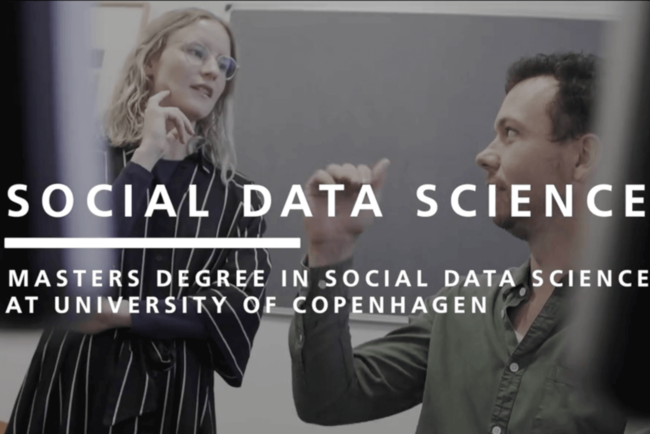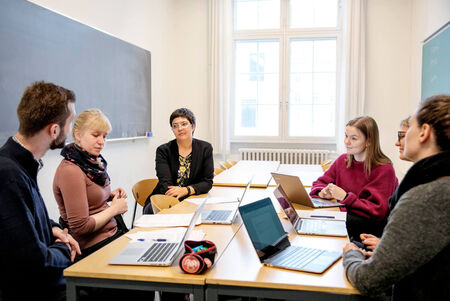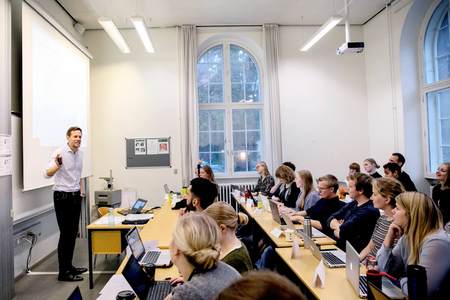About the programme
The master’s degree program combines state-of-the-art data science techniques, including machine learning, predictive analytics and natural language processing with core sociological, economic, anthropological, political science and psychological theories and methods to equip students with the competences to identify, assess and solve societal and business problems in the digital age.
What makes the programme at UCPH unique?
If you wish to achieve advanced training in a rapidly evolving interdisciplinary field, consider this program. Here, you’ll gain expertise in analysing large amounts of unstructured data (commonly known as ‘big data’) using social science research methods. The curriculum seamlessly integrates cutting-edge computer science techniques, including machine learning and predictive analytics, with essential social science theoriesWhy is this programme relevant?
The Graduates with interdisciplinary data science skills are in high demand across various sectors, including industry, service, technology businesses, and consulting firms. Graduates with skills in social data science are sought-after by organisations all over the world. In the Danish labour market, companies such as COWI, Deloitte, DFDS, IBM, McKinsey, Mærsk, Novo Nordisk and Ørsted are all looking for graduates within social data scienceConsidering studying at UCPH this September?
Apply by 15 January if you are an applicant from outside the EU/EEA/Switzerland. Apply by 1 March if you are from the EUAdmission and application
To apply for admission to this master's degree programme, you must have completed a qualifying bachelor’s degree or a similar Danish or international degree programme which is assessed to be relevant. Apply for admission via the application portal.
Below, you can read more about admission requirements and which documents to upload in the application portal.
Academic admission requirements
Here you'll find the different academic requirements depending on which qualifying degree you hold.
Academic admission requirements
In order to be admitted into the MSc in Social Data Science, applicants must meet the following requirements:
- Hold one of the following Bachelor’s degrees from a Danish university, a Bachelor’s degree from a Danish university equivalent to any of the fields below or a Bachelor’s degree from a recognised international university equivalent to any of the fields below:
| Agricultural economics | Global business informatics |
| Anthropology | International business and politics |
| Business administration and digital management | Mathematics-economics |
| Business administration and project management | Organisational learning |
| Business administration and psychology | Political science |
| Business administration and sociology | Psychology |
| Cognitive Data Science | Public administration |
| Digital design and interactive technologies | Public health |
| Economics | Social science |
| Economics and business administration | Sociology |
| Education science | Sociology and cultural analysis |
| European business | Techno-anthropology |
| European ethnology |
- Or hold a Bachelor’s degree from a recognised Danish or international university with at least 30 ECTS credits from social sciences courses of which at least one should be a practical methods course. Social sciences courses include, among other things, social statistics courses, ethnography courses and other courses on qualitative or quantitative data collection and analysis; courses on culture, organisation, leadership, innovation, management or related topics which involve empirical data collection, processing or analysis; and Bachelor and other self-defined projects which include social data collection, processing or analysis.
- All applicants must hold English language proficiency corresponding to at least the Danish upper secondary school 'English level B. (For information on how to meet the language requirements, please click here).
Degrees that do not qualify for admission:
For your guidance the following Danish degrees do not qualify for admission:
- Professionsbachelor i Eksport og teknologi
- Professionsbachelor i Finans
- Professionsbachelor i Leisure Management
- Professionsbachelor i Value Chain Management
- Professionsbachelor i Økonomi og informationsteknologi
- Professionsbachelor i Offentlig administration
- Professionsbachelor i Skat
- Professionsbachelor Socialrådgiver
The list is not exhaustive.
Language requirements
You are required to document that you fulfil the language requirement English B, unless you have a legal right of admission to the programme you are applying for.
Please note that you must have the documentation ready by the application deadline.
Application deadlines
Study start in September
1 March at 23:59
Application deadline for Danish applicants and applicants from within the EU, EEA and Switzerland.
Open for applications from 16 January. You will receive a reply by 10 June.
15 January at 23:59
Application deadline for applicants from outside the EU, EEA and Switzerland.
Open for applications from 15 November. You will receive a reply by 13 March.
Application procedure
Before you apply to the master's degree programme in Social Data Science, please make sure to acquaint yourself with all the important information on the application procedure, application deadlines and details about how to apply. Select an option below to read more about your application.
If you are a citizen in Denmark, EU, EEA or Switzerland
If you are a citizen in a country outside EU
Have you been enrolled before?
How your application is assessed
Prioritisation of applicants
As the Master’s degree programme only admits a limited number of students each year, meeting the admission requirements does not in itself guarantee admission to the programme. Allocation of student places is based on an overall assessment.
If more applicants than the maximum intake allows for fulfil the admission requirements, a selection will be made on the basis of a comprehensive evaluation, with emphasis on the following criteria:
- Portfolio of bachelor courses relevant for the MSc in Social Data Science
- In addition to social science courses, this includes other courses with substantial coverage of data science, programming, statistics and/or quantitative methods.
- Relevant experience with quantitative methods and data handling obtained in the course of your bachelor’s studies.
- Grades achieved on bachelor courses relevant for the MSc in Social Data Science. Note: the assessment of grades is made solely on the basis of the transcripts and grades submitted before the application deadline. Grades submitted after the application deadline will not be included in the selection of applicants.
- Statement of professionally relevant experience for the MSc in Social Data Science (maximum one page). The document must describe what the experience consists of and why it is relevant. For example:
- Relevant work experience, incl. unpaid work
- Coding experience from extra-curricular activities and self-acquired proficiency with e.g. Python or R.
- Participation in social data science related research projects.
- Experience -from educational and/or work contexts – with group work and team-based collaboration.
Any improved grades are not considered. This is due to the fact that in Denmark it is not possible to improve grades in courses that has already been passed on the Bachelor's degree programme. Thus, if you have been awarded more than one grade in the same course, we will only consider the grade that you were awarded the first time that you passed the course when calculating your grade point average.
All applicants from non-Danish universities must, consequently, upload a complete transcript showing all examination attempts, the date of each examination attempt and the appurtenant exam result. If the applicant is unable to obtain a complete transcript from the home university, a confirmation that the applicant's transcript does not contain improved grades issued by the current home university is required instead.
Random checks of the applicant's basis for admission may also be made to the home university. In the case of admitted students, any fraudulent information in terms of grades may result in the student being deregistered from the degree programme in case of admission without entitlement.
However, any grade awarded on the basis of an appeal against the original grade will be considered. In this case, it must be clearly stated that this is an improved grade as a result of a complaint. Any such grade must be made available to the Faculty no later than the deadline for applications. Otherwise, the grade can only be considered in subsequent application rounds.
Random checks of the validity of international exam results will be carried out.
If you are in doubt about the rules or have questions about your entry qualifications please contact Student guidance.
If you already have a master's degree from Denmark or another country, you can, in principle, only be admitted to a new degree programme if there are places available on the programme for which you are applying for admission (the master's degree admission rule).
In exceptional cases, we may grant dispensation from the master’s degree admission rule. Read more about the master's degree admission rule and the possibility of applying for dispensation here.
| Admission statistics Social Data Science 2025 | |
|---|---|
| Admitted (of which have start in February) | 63 (0) |
| Admission distribution (legal right/other) | 0% / 100% |
| Applicants | 337 |
| Age average | 25 |
| Nationality (dk/international) | 29% / 71% |
Programme structure

The MSc in Social Data Science at the University of Copenhagen is a two-year programme taught in English. While it combines numerous methods and analytics from ethnography to machine learning, it adds up into a unified whole.
The programme is structured as a combination of compulsory courses for the first two semesters with plenty of scope for individual tailoring in the second year, since third-semester students can do internships, fieldwork or elective courses. You will spend the fourth semester individually or in a group working on your thesis, which must be handed in at the end of the semester.
The study programme is based on three central concepts – behaviour, networks and ideas – which the new field of social data science shares with the five existing social science disciplines taught at the University of Copenhagen (anthropology, economics, political science, psychology and sociology).
Behaviour is concerned with what people do – their practices and decision-making processes. Networks are about the connections they make – social relations and their organisation and institutionalisation. Finally, ideas refer to what people know and think (including what they think they do) – their knowledge, preferences and values.
From the moment you start on the MSc in Social Data Science programme, you will work closely together with your fellow students in classes, field exercises and other curricular and extracurricular activities. It is therefore vital that you as students get to know, respect and trust each other.
To foster a social learning environment, the first semester of the programme is comprised of a base camp which introduces you to the interdisciplinary field of social data science and central methods and theories as well as key analytical and ethical questions arising from its practical application on concrete cases.
First year
| Semester 1 | Semester 2 |
|---|---|
(15 ECTS) | Advanced Social Data Science I (7.5 ECTS) |
Elementary Social Data Science (7.5 ECTS) | Advanced Social Data Science II (7.5 ECTS) |
| Social Data Analysis (7.5 ECTS) | Data Governance: Law, Ethics, and Politics (7.5 ECTS) |
(7.5 ECTS) |
Second year
| Semester 3 | Semester 4 |
|---|---|
Elective courses and mobility window (30 ECTS) | Master’s Thesis (30 ECTS) |
PhD student Ulf Aslak
Ulf Aslak talks about his research in mapping of social groups and networks based on data from smartphones (the social fabric project).
Postdoc Laura Alessandretti
Laura Alessandretti discusses human mobility.
Anthropologist Kristoffer Albris
Kristoffer Albris talks about DPOs and data governance in Denmark.
Sociologist Anders Blok
Anders Blok talks about his research in urban green communities in Danish cities.
Anthropologist Morten Axel Pedersen
Morten Axel Pedersen talks about social data science in relation to party sociality: What is a social atmosphere?
Programme Curriculum
If you are more interested in the academic content, regulations, and examination requirements, you should consult the curriculum, which serves as the legal foundation for the programme.
There is both a curriculum specific to each degree programme and a general curriculum that applies across the faculty.
Please note that curricula are often revised annually. Any new versions will be published no later than during the spring semester.
Career opportunities
“There is a great need for integrated disciplines – people who can ask the right questions based on an academic analysis, and search for answers in the huge and complex data sets we have available today. In this respect, the MSc in Social Data Science programme is very interesting because it combines a number of core academic disciplines within the social sciences, thus giving them partly an interdisciplinary profile and partly an ‘extra gear’ for data analysis. I have no doubt that the graduates will be in high demand in both the private and the public sectors.”
Casper Klynge, Tech Ambassador of Denmark
Upon completion of the master’s programme, you will obtain the title Master of Science in Social Data Science.
The study programme opens up possibilities for several types of employment, partly depending on how you decide to specialise during the second year.
Many graduates will go on to jobs in the private sector. Others will find employment in public and non-profit institutions and organisations in Denmark and abroad as well as in international organisations.
There is a considerable need for interdisciplinary data science skills in industry, service and technology businesses, and for consultants in local and global markets.
As a graduate from this programme, you can help realise this potential. Finally, as a graduate you can pursue a research career in social data science and related disciplines.
As a graduate, you will be able to
- Independently design, handle and analyse complex and large data sets comprising various data about behaviour, networks and/or ideas, including personal data, data and metadata from a variety of sources, in order to contribute with new and original knowledge to solve societal and business problems.
- Understand and observe legislation concerning data (including GDPR and IPR), and observe and develop rules and protocols – and ethical principles – for the collection, storage, sharing and usage of data, including personal data.
- Access and evaluate data-analytical potentials and pitfalls in research, public policy or business settings.
- Lead and coordinate teams comprised of people from a diversity of professions who collaborate on deploying social data science to create new value and solve societal and business problems.
- Identify future challenges and opportunities pertaining to social data and digitalisation writ large.
Overall, by combining social science and data science knowledge, skills and competences, you will be able to work individually and in teams with social data science issues at the highest international level. You will be able to provide solutions grounded in state-of-the-art social data science research, analyse problems and cases involving novel digital data forms and methods, and communicate your knowledge and your results to a wide range of audiences.
Student life
Study environment
The structure of the programme with compulsory courses, group work during the first year, elective courses, internship or fieldwork ensures a lively study environment and close interaction with your fellow students.
For general information about student life and studying at the University, see Student life at UCPH
Living in Copenhagen
Check out what MSc student Gus thinks about living in Copenhagen.
FAQ
Does my degree qualify me for admissions?
With 60 study places for the MSc in Social Data Science programme, we may receive more applications than we can honour. For your own sake, we therefore ask you to make sure that your degree qualifies you for admission before applying for admission.
If you look at the programme structure, you will find a diagram of the courses we are currently offering. If you click each course, you will find more information about the course, the names of the course organiser and the teachers on the course.
The courses currently listed at www.kurser.ku.dk are the courses currently offered, and they are therefore subject to change.
As the MSc in Social Data Science is an interdisciplinary master’s degree programme which consists of interdisciplinary courses based on the collaboration of teachers coming from various social scientific areas and specialisations, the list of teachers involved in the programme is subject to change.
For the most updated list, you can take a look at the course descriptions under programme structure (See above). You can read about the specific course by searching for the title in www.kurser.ku.dk.
The MSc in Social Data Science is unique in that it is a truly interdisciplinary programme involving five departments at the Faculty of Social Sciences at the University of Copenhagen as well as researchers from the Copenhagen Center for Social Data Science (SODAS). The courses have all been developed in close collaboration between at least two teachers from different departments as well as in collaboration with data scientists from SODAS, which ensures a cross-disciplinary take on all subjects forming part of the programme.
Furthermore, the programme also emphasises cross-disciplinary collaboration between the students. From the onset of the first semester, students will work in small study groups, where they will get the chance to work closely with students from other academic backgrounds than their own. This way, the students are constantly encouraged to share their experiences, views and knowledge.
Read about tuition fee and payment here.
If you click Application procedure and choose your citizenship, you will find a complete checklist on what to upload. In the user guide, you will find a lot of helpful information regarding the application procedure.
If you click Application procedure and choose your citizenship, you will find a complete checklist on what to upload – and a guide on how to do it.
Generally, it can be difficult for students to find a place to stay in Copenhagen. We recommend that our students start looking for a place as soon as they are admitted to the MSc in Social Data Science programme, as it may take a while to find housing.
The Faculty of Social Sciences is not able to provide housing or accommodation to its MSc degree students.
There are many Internet pages where housing or accommodation is offered and requested. We recommend that you look at the various online housing portals. You can read more about housing at the University of Copenhagen’s Welcome International Students site.
At the website Study in Denmark, you will find a lot of different information about living in Denmark, including information on permits, visas, health, accommodation, work etc.
At the website Study start – MSc students, you can read more about studying at the Faculty of Social Sciences at the University of Copenhagen.
The rules for Danish residence documents – including work permits – depend on your citizenship.
If you are offered admission to the MSc degree programme in Social Data Science, the Faculty will send you elaborate information about how and when to apply for .
CPR stands for Det Centrale Personregister, which translates to the Civil Registration System.
A CPR number is a personal identification number which, among other things, facilitates accurate linkage between all Danish national registers.
Your CPR number consists of ten digits. The first six digits are your date of birth, and the last four are your unique identification number. The last digit of your CPR number indicates your sex. If it is an odd digit you are male, and if it is an even digit you are female.
Residents of Denmark are legally required to have a CPR number. You will also notice that your CPR number grants your access to a number of services in Denmark. You will need it in order to open a bank account, get a Danish phone number, borrow books at the library, take out insurance, etc.
If you are offered admission to the MSc degree in Social Data Science, the Faculty will send elaborate information on how to obtain your CPR number.
Read about student life at UCPH
What is student life like across the rest of the University of Copenhagen?
Find out where you can live, get more information about student grants (SU), student jobs, student discounts, and all the many other things that are part of student life.

Get to know City Campus
Teaching takes place at City Campus - located between the lakes and the Botanical Garden, close to Nørreport Station.
At City Campus, you will find degree programmes within social sciences, health sciences, and natural sciences.
Contact student guidance
Questions about study choice and admission
Our student guidance are ready to assist you with answers to your questions about:
- application procedure and the digital application portal
- admission- and language requirements
- documentation
- study life
- career opportunities
- study choice or doubts
Did you not find what you were looking for?
You can find answers to questions most often asked by potential students in the FAQ. Read the FAQ
Questions about the digital application-portal?
Do you have questions about digital application? Check our user guide to the application portal.
In case of technical problems, please contact the IT-support by
- Mail: it-service@adm.ku.dk // Tel: +45 35 32 32 32
Location
- City Campus, Øster Farimagsgade 5, DK-1357 København.











